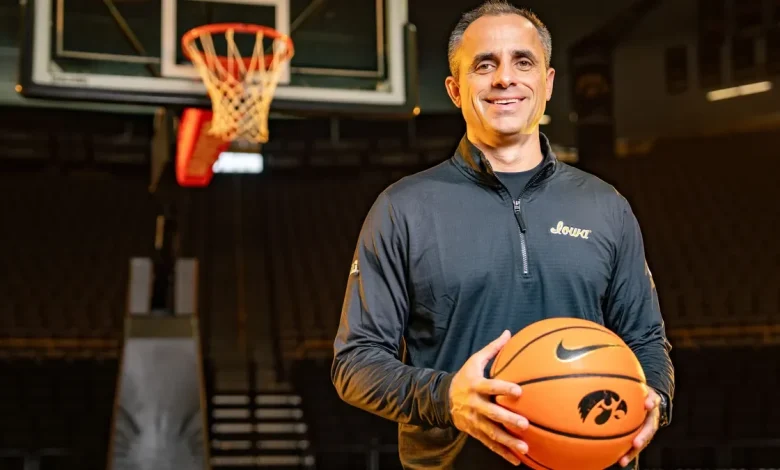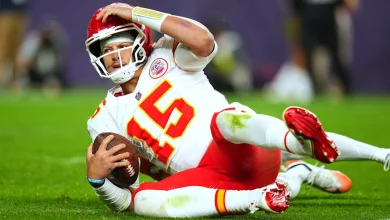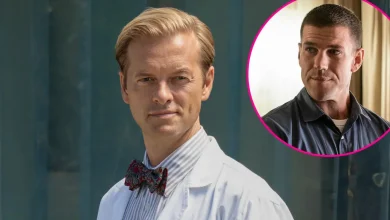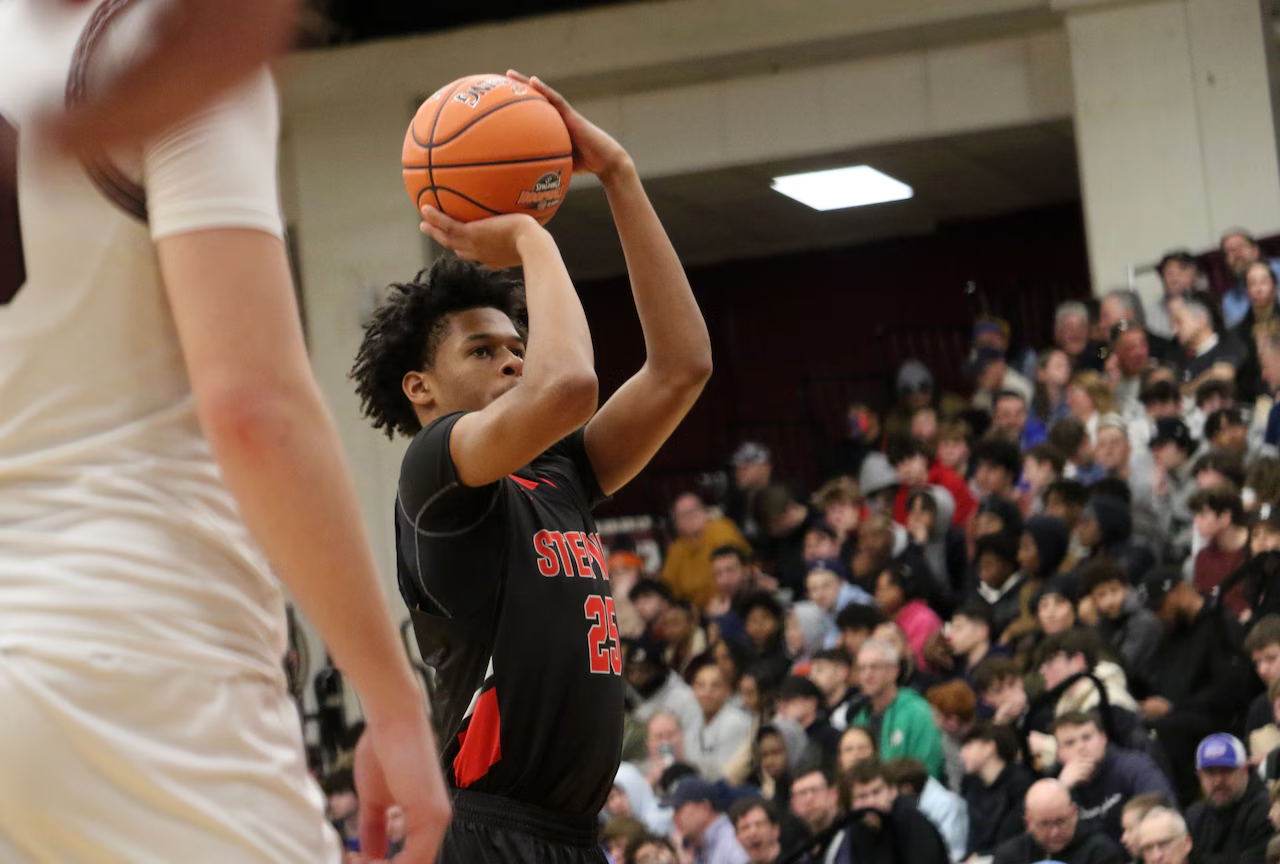Iowa men’s basketball coach Ben McCollum and the beauty of the journey

Ben McCollum: ‘I’ve always worked better with a chip on my shoulder’
Head coach Ben McCollum speaks at Iowa men’s basketball media day on Oct. 15, 2025.
IOWA CITY — At age 41, Ben McCollum ran his first marathon.
McCollum, the head basketball coach at Northwest Missouri State at the time, accidentally ran the first half of the race faster than he wanted. His average minute-per-mile pace at the half-marathon mark was 8:32. McCollum tried to do the math and realized what was going to happen.
“I knew,” McCollum says, “I was going to hit the wall.”
In some ways, long-distance running is the ultimate mental battle. There was no one else stopping him from finishing the race — no one trying to defend him, like during his playing days, nor an opposing coach trying to disrupt his game plan.
When that wall came, it was quite literally a battle with himself.
“I never walked,” McCollum told the Register. “Not one time did I walk. But when you hit that wall, it’s different. Your body just seizes up, and it is a fight. It was an eight-mile all-out war. It was brutal.”
Given where he is professionally, McCollum’s motor shouldn’t be much of a surprise.
One does not have the success he’s had by coincidence. Now at 44 years old, McCollum is viewed as one of the brightest up-and-coming coaches in college basketball. Thanks to an incredible season at Drake, his name was a commodity on the coaching carousel. Ultimately, wins will be the final judge, but the initial response to Iowa’s hiring of McCollum as its new men’s basketball coach was overwhelmingly positive.
Take it from Chad Buchanan, who is knowledgeable on the topic of evaluating people in the basketball world.
The Indiana Pacers general manager is one of the masterminds of a team that was one win short of winning the 2025 NBA title. More than two decades ago, Buchanan was an assistant at Simpson College, where he recruited McCollum as a high schooler.
“I remember watching him practice and I swear he went harder in practice than he did in the games I’d seen him,” Buchanan said of McCollum. “And I’m like, there’s something about this kid.”
The start line
Legendary Duke coach Mike Krzyzewski takes a seat to speak with media after a narrow six-point victory in 2019. It was just a preseason exhibition, but McCollum nearly pulled off the improbable.
Northwest Missouri State went into the iconic Cameron Indoor Stadium and gave a blue-blood program quite the test. The Bearcats, who trailed by six at halftime, used a frenetic late run to play the Blue Devils even in the second half.
“I know how good of a coach he is,” Krzyzewski said after the exhibition, referring to McCollum.
Receiving praise from Krzyzewski is pretty good for someone who hadn’t even planned to be a coach.
McCollum, who was born in Iowa City before later moving to Storm Lake, grew up rooting for the Hawkeyes. His mother, Mary Timko, attended the University of Iowa and later worked as a judge. McCollum’s stepfather, Roger Timko, served in the Iowa Division of Narcotics Enforcement (DNE) and Division of Criminal Investigation (DCI). He spent time as an undercover narcotics officer while with DNE.
McCollum’s original career path did not include coaching. He earned a bachelor’s degree in business finance from Northwest Missouri State. After his playing career — which spanned stints at North Iowa Area Community College and Northwest Missouri State — McCollum worked at Wells Fargo.
But after a few months, McCollum didn’t feel like he was making the difference he wanted.
He shifted directions to coaching. McCollum was a graduate assistant at Northwest Missouri State before taking a job as an assistant at Emporia State. In 2009, he returned to Northwest Missouri State for his first head coaching job.
“I remember how hard he worked,” said Austin Meyer, who was on McCollum’s first staff at Northwest. “I can remember, we’d be there all day, and you’d leave the office, and then 20 minutes later, I’m getting a phone call. His mind just never shut off. It was just, what do we got to do in recruiting? Or what do we got to do ball-screen defense? It’s just a constant thing.”
But initially, the results didn’t show. The Bearcats combined to go just 22-31 in their first two seasons with McCollum as head coach. During those trying times, McCollum questioned himself.
“You got to a point where it was just like, I need to hang this up,” McCollum said. “This isn’t probably for me.”
But there was progress toward the end of that second season as Northwest Missouri State won six of its last nine games.
From then on, McCollum’s resume speaks for itself.
He won four Division II national titles at Northwest Missouri State, including a perfect 38-0 campaign. After 15 seasons as head coach at Northwest Missouri State, McCollum went on a remarkable run at Drake, leading the Bulldogs to a 31-4 overall record and drawing national attention.
The last time a McCollum-coached team lost double-digit games in a single season was the 2012–13 campaign, a streak that will be put to the test at Iowa.
“It was wild to me, in January, people would ask, how’s the season going? What’s your record? And he wouldn’t know,” said Dr. Andy Peterson, who worked with McCollum on his staff and as Northwest Missouri State’s director of athletics. “He truly wouldn’t know what our record was. Now he might be able to tell you, we’ve got two losses, because they were so few and far between you pull them out, you could recall them. But he didn’t know, were we 18-2? Or were we 20-2? Or 15-2? He didn’t know because he wasn’t worried about it. He was so enthralled on the process.”
Pushing the pace
After already having completed speed squats and a conditioning drill, someone made the mistake of saying they couldn’t do what is referred to as a “20 in 20.”
In the physically and mentally demanding workout, players are supposed to run:
- Baseline to near free-throw line and back
- Baseline to half court and back
- Baseline to opposite free-throw line and back
- Baseline to baseline and back
- Baseline to baseline and back one more time
They have one minute to complete that. If you finish early, the remaining time can be used to rest.
That’s one of 20 consecutive reps in a workout that spans 20 minutes, hence the name, “20 in 20.”
On that particular day at Northwest, someone said they didn’t think they could do a 20 in 20 after the already taxing session.
“So as (McCollum) being (McCollum),” said former Northwest star Trevor Hudgins, the coach made the team run a 20 in 20.
After most failed to finish, McCollum had the team do it again.
“It was a lot of just, break you down,” Peterson said of McCollum’s notoriously difficult conditioning. “Not to the extreme of military training, but almost one of those like, I break you so far down that, as we build you back up, now I’m molding you into the basketball player that we need you to be.”
McCollum’s style of coaching reflects how he operated as a player.
Once, as a player at Northwest Missouri State, McCollum was vomiting uncontrollably. He did not want the staff to know, because he knew he’d have to sit out. So McCollum went to the emergency room to be treated and kept the trip to himself.
“I wanted to practice,” McCollum said.
While on a visit to Northwest Missouri State as a high schooler, Meyer got a sense of what McCollum brought to the table.
“We’d scrimmage,” Meyer said. “And I remember like, who is this dude over here that’s playing like it’s a national championship game? He was playing so hard.”
During practices, McCollum’s former teammate, Scott Fleming, was on the receiving end of that.
“He, frankly, was a huge pain in the a— to go against in practice every day because he’s elitely competitive,” Fleming said. “… He was just a bulldog. If you were going against him in a drill, man, you’d be like, oh my gosh, here we go again.”
Clearly, McCollum’s internal fire is not confined to the sport of basketball.
One time, while playing tennis with his stepfather, Roger, McCollum’s frustration boiled over to the point that he slammed his racquet on the ground, got on his bike and pedaled home. One of the moments that stood out from high school recruit Tate Sage’s visit to Drake (when McCollum was still the head coach of the Bulldogs) was McCollum and assistant coach Bryston Williams’ competitiveness playing pickleball. After throwing out the honorary first pitch at an Iowa baseball game in April, McCollum explained to athletics director Beth Goetz how it would’ve generated weak contact.
In Missouri, McCollum played slow-pitch softball.
“He’d be on the phone recruiting or whatever and he’d roll in two minutes before first pitch, but then he’d play it like it was game seven of the World Series,” said Meyer, “like he was Derek Jeter at shortstop.”
McCollum’s methods can be unconventional, to say the least. One of his pregame superstitions is having a Snickers bar and a black coffee. The simple answer for McCollum’s gameday outfit — a white button-down shirt and tie — is because it looks professional. But there’s also a deeper answer. The color of the tie stays the same because it’s one less decision he needs to make that day, and becomes a rigid routine.
McCollum is aware enough to admit that his superstitions are “probably completely and utterly irrational,” but that does not stop him from doing them.
And yet, McCollum isn’t too wound up to be an unlikeable personality.
People want to be around him. There is plenty of evidence of that.
Players and staff followed him in his transitions from Northwest Missouri State to Drake and Drake to Iowa. Undergraduate student manager Brayden Parra has now been to three schools in three years just to work under McCollum. Iowa assistant coach Luke Barnwell left Texas Tech, a program that was just on the doorstep of making the Final Four, in part to be with McCollum.
Kansas State transfer Brendan Hausen said of why he chose Iowa: “It was the obvious reason — coach (Ben McCollum), the culture he’s built.”
McCollum was humble enough to go into the student section at Kinnick Stadium to interact with fans before Iowa football’s 2025 season opener against UAlbany. After appearing at a Carroll Area I-Club event in April, McCollum stayed to help put chairs and tables away unprompted. McCollum enjoys fishing and used to lightheartedly give now-former Northwest Missouri State football coach Mel Tjeerdsma a hard time for having a boat that leaked.
“I feel like off the court, away from media and all that stuff, he’s just down to earth, funny,” Hudgins said of McCollum, a father of three. “Just a normal guy, a normal dad, loves to have time with his family, friends, all that.”
Crossing the finish line
McCollum’s running form for the home stretch of the marathon was far from orthodox. His feet barely made it off the ground in what could be described as an urgent forward shuffle. McCollum was so exhausted after the race that he could barely speak.
McCollum’s chip time had him finishing in just under four hours and 25 minutes.
“I never walked,” McCollum reiterates. “Never walked.”
That is part of the way McCollum is wired. It’s not just the fact that he got to the finish line, it’s how he got there.
“I hated the marathon,” McCollum said. “It was absolutely the worst thing that I’ve ever done. It was horrible. But I loved training for it. I loved getting up in the morning and not wanting to do it, and then going and doing it. The gratification of the work. I loved it.”
When McCollum inevitably hit that wall, he kept going.
“I’m not going to stop, you know?” he said. “Just not going to stop. It’s just what you do. You fight. There’s a goal and you’ve got to finish it. That’s just what you do. It’s just of the nature of, that was why I needed to do it. It was fun.”
For someone who has won so much, it’s easy for there to be a misconception about McCollum’s relationship with it. Despite what conventional logic might say, the wins themselves are not why he is so relentless.
“Winning doesn’t excite me that much,” McCollum said. “For me, when you win the championship or when you win a conference or you win a game, it doesn’t excite me like it would somebody else. When you see teams celebrate, I don’t know, it doesn’t do it for me. I absolutely love practice. I love it. I love delayed gratification. I love the work every single day. I love the fight to get better for the competition.”
It’s not like the program he is currently undertaking has never had success, but it will take some rebuilding. This is a fan base that needs reason to re-engage with the program. The Hawkeyes have not made the NCAA Tournament since 2023. They have not won a game in the Big Dance since 2021, something that McCollum accomplished in his first season as a Division I head coach at Drake.
Less than one week before Iowa’s season opener against Robert Morris, McCollum states that his marathon-running career is behind him, only to quickly reopen the possibility, as if he’s threatening to put himself back in that mental cage match.
“Yeah, I’m done after that,” McCollum says, before contradicting himself just a second later. “I might run another one. Because sometimes, I think you need to suffer a little bit to make yourself better, and you need to challenge yourself.”
It’s not the finish line he is seeking. It’s what comes along the way.
“I didn’t chase this job, you know?” McCollum said. “But I chased being good at Northwest and trying to make a difference in those kids’ lives. I just chased that. I never chased a win. That’s probably what I’ve never chased. I’ve never chased a championship. I’ve never chased this job. Some of it just happens. And that’s probably why it happens, because you don’t chase it. Because you don’t control the results of a lot of those things. But you do control how you act every single day.”
Follow Tyler Tachman on X @Tyler_T15, contact via email at ttachman@gannett.com





